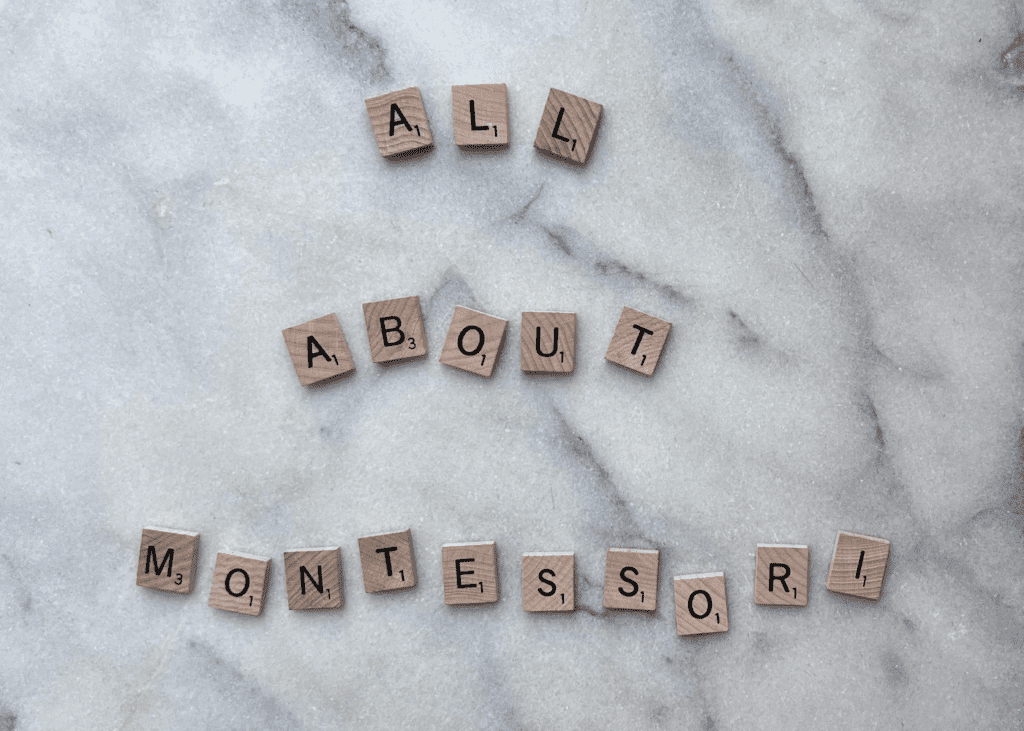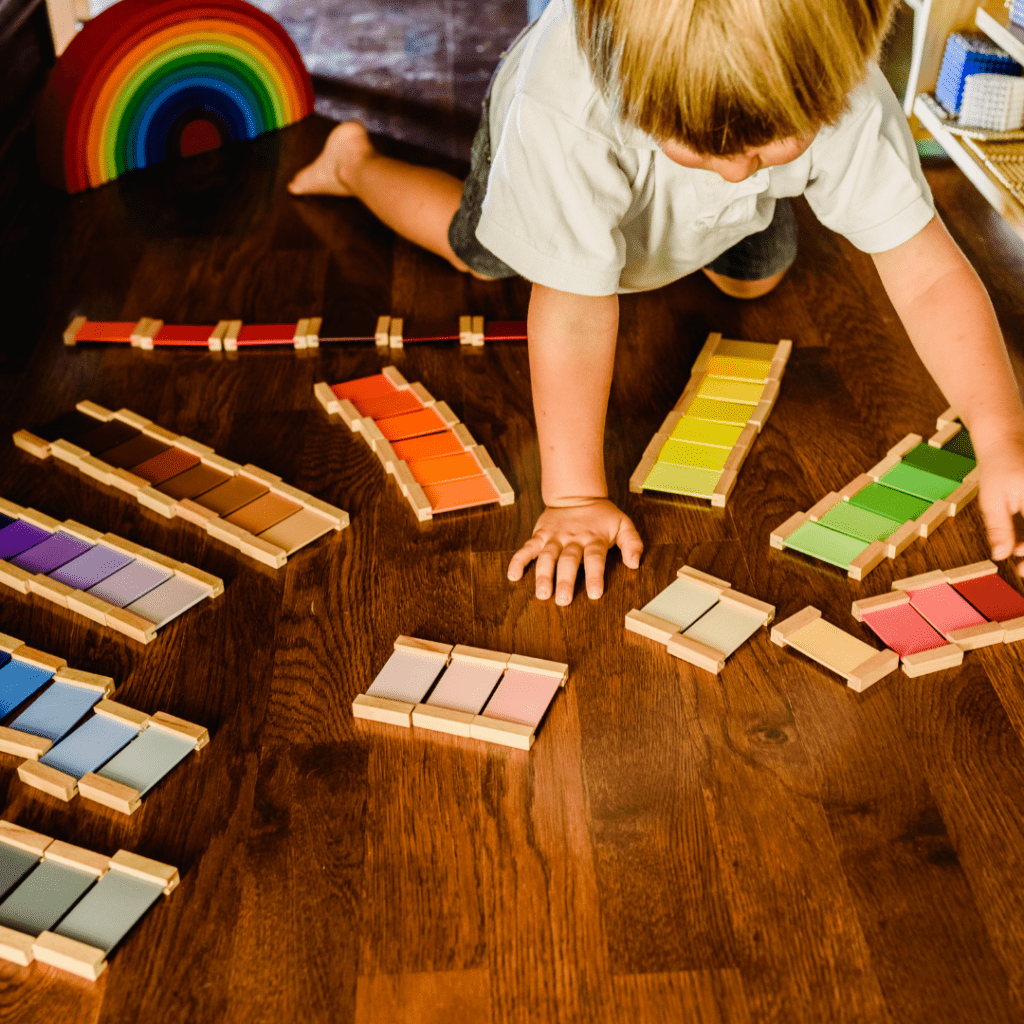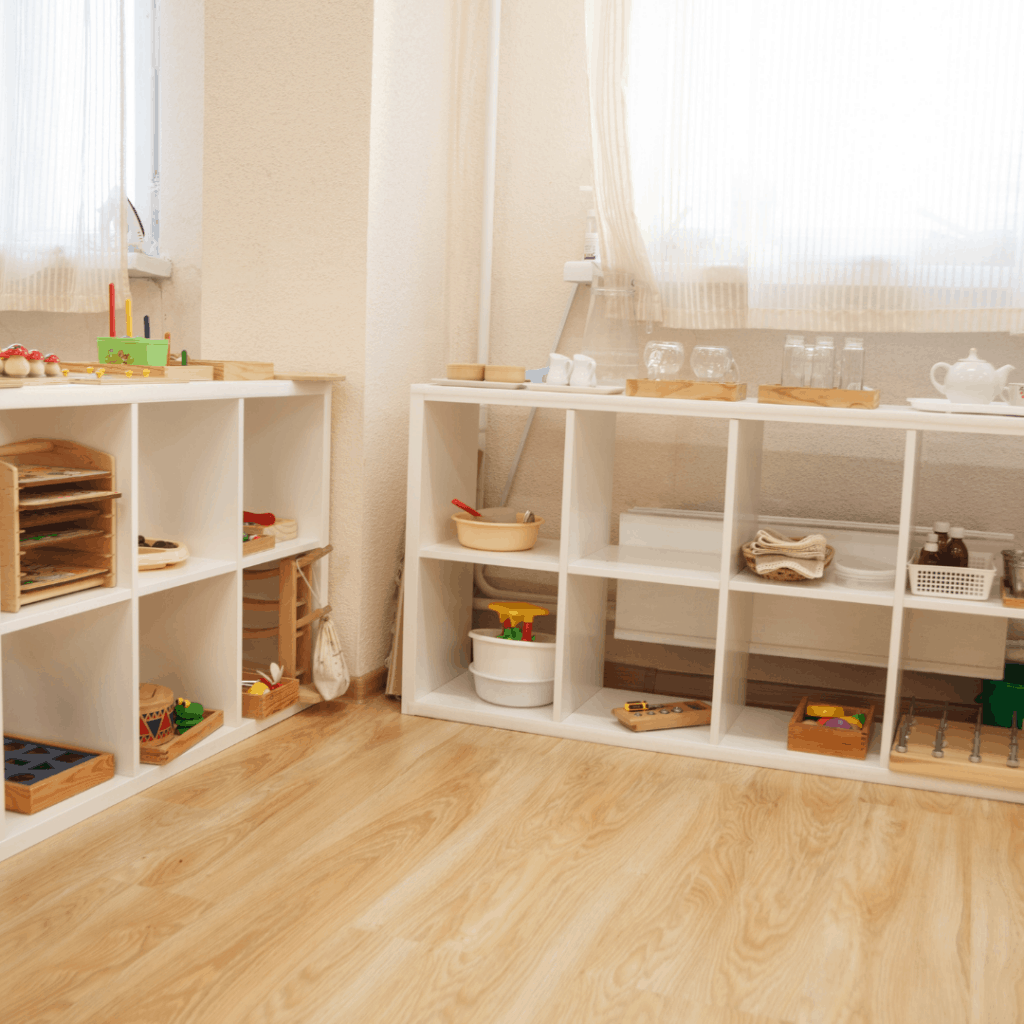This post talks all about the Montessori Method: Self-direction, hands-on learning, and collaborative play. These are the philosophies that Montessori classrooms and Montessori-friendly homes and parenting styles are centered around. If you’re wanting to learn more about the Montessori method, or are wondering if it makes sense for your family to adopt this style of learning, keep reading!
This style of education was developed by the Italian physician, educator, and visionary Maria Montessori in the early 1900s. Today, Maria Montessori’s methods have been successfully implemented in schools and homes across the globe. Here is how and why so many families are adopting this pedagogy.
And, if you’re already a fan of Montessori education, but are wondering how to implement the philosophy at home, read more here!

Montessori method of education
Maybe you’ve heard of this method before, or have noticed Montessori centers in your area and wondered what the difference is between this and public education.
Perhaps you’ve seen the many toys, activities, and furniture that have been hot on the market in the last few years. This type of childhood education is definitely getting more popular in early childhood education due to its many benefits.
But, on the off-chance that you’ve never heard of it at all – You’re still in the right place!
It is my hope that after today you will understand what Montessori is all about! I’ve also included some lists below to help you determine if adopting Montessori teaching is practical for your family.

Why I love Montessori classrooms
Firstly, let me tell you a little about why this method appeals to me personally.
As an aspiring elementary teacher and lover of child-first approaches to education, this style of learning piqued my interest.
The way that this educational theory engages children’s natural curiosity to learn and discover directly aligns with my personal educational philosophy, too! Actually, this was what initially attracted me to the concept.
Now, after doing research on the efficacy of the approach, I also support the method for its ability to teach conflict resolution while empowering young learners to be self-sufficient and confident individuals. It is the ideal blend of teaching academic skills, intellectual independence, and social-emotional learning.

As an added bonus: The organization, simplicity, and beautiful designs of Montessori products are also super aesthetically pleasing! Just look at this beautiful play space…
Sounds Great, Right? Let’s dive into what a Montessori program actually looks like in school settings and in the home…
What is Montessori education?

Photo of Maria Montessori in 1933, photo from Montessori Centenary.
Dr. Maria Montessori founded this now internationally renowned approach to learning. Though the woman is deserving of an entire article dedicated to her incredible work detailing children’s social, intellectual, physical, and spiritual development, I’ll try not to fan-girl too much over this inspiring visionary…
Ok, but seriously, her work has been so influential that she has been awarded not 1 but 3 Nobel Peace Prize nominations – How incredible is that?!
Maria Montessori’s vision…
“My vision of the future is no longer of people taking exams and proceeding on that certification… but of individuals passing from one stage of independence to a higher, by means of their own activity, through their own effort of will, which constitutes the inner evolution of the individual.”
Introduction, From Childhood to Adolescence, The Clio Montessori Series, by Maria Montessori
Basically, this approach to education emphasizes self-led and hands-on learning alongside collaborative play.
By offering both individual and group activities, Montessori empowers children to explore a prepared environment in a hands-on way while inspiring them to become confident life-long learners.
Montessori teachers are well-versed in child development, with a firm understanding of how children learn. The trained teacher focuses on the whole child, delivering educational programs that enhance the child’s natural desire to learn.
Montessori students will engage with specially designed learning materials that teach them both academic and life skills as they explore under a education philosophy of freedom within limits.
Montessori schools
The Association Montessori Internationale (AMI)is the overarching body and international institution that Maria established in 1992. AMI is also currently responsible for upholding training and research standards. They also offer an online resource library for anyone wanting to learn more about the method, making this a great starting point for inquisitive minds!
Also, Montessori Education was created to suit the needs of learners from babies to middle-school-aged children. This means that regardless of your child’s developmental stage, you’re sure to find products perfect for their current abilities!
Due to the method’s international success, there are limitless tools available for parents wishing to implement Montessori principles in the home as well.
But how do you know if this approach is right for your little ones?
Is Montessori right for your family?

Many young learners experience great success through this style of education. If the benefits discussed below sound like skills you want your child to develop – I’d suggest you consider implementing these techniques in your own home or look into local Montessori schools near you!
Montessori cshool benefits
1. Enhances preschooler’s readiness to enter primary education
Gokhan & Ramazan conducted a study in 2011, titled “Examination of the Effects of the Montessori Method on Preschool Children’s Readiness to Primary Education.”
In it, they concluded that the pre-school-aged children exposed to Montessori education exhibited higher readiness to enter the next phase of their learning than those who learned in traditional education settings.
2. Higher social, language, and concentration skills
In the same study, Gokhan and Ramazan also found that preschool-aged children taught under Montessori maintained a higher capacity for learning the above skills (2011).
3. Focus: Nourishing healthy relationships while enhancing self-regulation
This forges stronger and healthier bonds between children and their educators alike while teaching young ones to express themselves and their needs
4. Early exposure to peace education and concepts of compassion and non-violence
Cheryl Duckworth’s article, “Teaching Peace: A Dialogue on the Montessori Method,” (2006) concluded that exposing young Montessori learners to the concept of peace, compassion, and non-violence was highly beneficial.
It actually resulted in them having increased capacity for conflict resolution!
5. Teaches collaboration and empathy at the individual and global level
Duckworth also mentions that the Montessori curriculum emphasizes collaboration and empathy. This not only reduces inner conflict within the child but increases their ability to resolve problems between peers (2006).
6. Encourages learning about international customs, cultures, and worldviews,
In this method, children are taught to be sensitive to global diversity and empathetic to differences between cultural groups.
7. Individually paced learning
Traditional classrooms sometimes embody rigid curriculum that does not consider individual needs and learning styles. Montessori seeks to address this by recognizing and accommodating individual needs.
American Montessori Society (AMS) has an excellent article that details this benefit here.
A Montessori classroom may also be ideal for your child if they have special needs that are not adequately addressed in a traditional classroom.
Maria Montessori had envisioned her philosophy as being inclusive for children of all needs and abilities, which is exemplified by her follow the child approach to learning (whereas traditional schools emphasize a follow the teacher approach).
8. Inspires life-long learning through hands-on exploration
AMS’s article above also highlights the positive impact that Montessori’s free-form learning environment offers.
Basically, while there is still structure and limitations, children are able to explore learning in a more natural and organic manner. Hands-on learning has also been found to inspire children and adolescents to pursue learning throughout their life-time
On the other hand, Montessori may not work for you if…
1. The cost is too high
While the learning materials are quite high-quality and durable, the up-front cost can be quite expensive!
There are, however, cheaper options on online sites like Montessori Outlet. Amazon also has lots of cheap options too!
Have a woodworker in your family? Perhaps you could convince them to re-create some Montessori staples from cheaper materials at home!
2. Montessori has been criticized as being inaccessible
Maria Montessori had strived to create a form of education that is inclusive, diverse, and accessible. Unfortunately, since the core tenants of Montessori education contradict the principles enforced in traditional school systems, many of their schools are private (and therefore costly).
However, as this mode of education becomes more popular, more and more public Montessori programs are popping up – Try looking around your area to see what is available!
3. Some children require (& thrive within) highly structured programs
Due to its follow-the-child approach, Montessori programs offer flexibility and looseness in their programming.
If your little one needs lots of structure then transitioning to this method may cause them to feel intimidated or stressed. Always be mindful of your child’s individual needs when considering big changes like this!
4. Collaboration
This probably seems contradictory. Didn’t I just say that Montessori programs increase collaboration?
Yea, I did! The reason this is also on this list is simple: Because the method favors self-driven learning, children who do not naturally enjoy working in teams may not develop the crucial skill of teamwork and collaboration required to be successful in today’s workforce.
Don’t get me wrong – Independence is also a crucial life skill. The potential issue I see here is that many careers require employees to directly report to their authoritative body. This could be tough if collaboration isn’t emphasized enough alongside fostering independence while in Montessori programming!
There you have it, folks! I hope this article piqued your interest in Montessori learning.


Leave a Reply